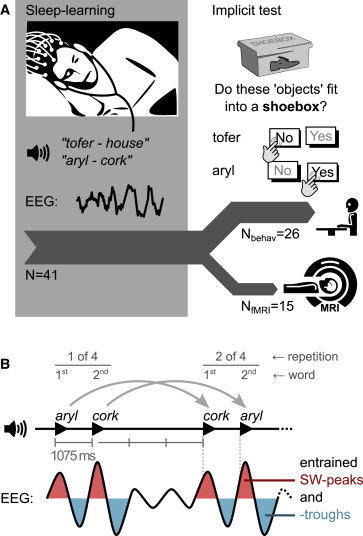Can we learn new vocabulary while we sleep?
According to new research, it is possible to acquire new language vocabulary during slow-wave sleep phases and it can be unconsciously recovered after awakening.
A nap can be used to memorize the words of a new language
Researchers at the University of Bern have shown that it is possible to acquire the vocabulary of a new language during slow-wave sleep phases and that the vocabulary learned during sleep can be unconsciously recovered after awakening. The formation of memory seems to be mediated by the same brain structures that also mediate the learning of vocabulary during wakefulness.
Made in collaboration with our partners from esanum.it
Learning while you sleep would really be a dream. In this way, sleep, which is considered unproductive time, could be used for something productive, for example learning a new language. This has always been considered impossible. Until now, sleep research has focused almost exclusively on stabilizing and consolidating the memories formed during waking. However, there is considerable evidence of information learned during certain phases of the sleeping brain. The memory replay during sleep reinforces the still fragile memory traces and incorporates the new information acquired in the existing baggage of knowledge.
If replay during sleep improves the storage of information learned during sleep, then the first processing of new information should also be feasible during sleep. This was the basis for the research carried out by Katharina Henke, Marc Züst and Simon Ruch of the University of Bern.
To explore this possibility, the phases of slow wave sleep have been studied. It has been hypothesized that the coding of the acoustically presented vocabulary may work during slow-wave peaks because these peaks are associated with cortical excitability and resemble those of the waking state. 41 young volunteers of German as a mother tongue were presented with pairs of words consisting of invented words (representing a non-existent foreign language) and real German words (e.g. "tofer-haus", where "tofer" does not exist and "haus" exists and means "home"). The German words pronounced during sleep represented an object clearly smaller or larger than a shoebox. After waking up, the subjects were presented with the invented words and asked to decide whether they represented objects larger or smaller than a shoebox. The test was successfully passed.
Image: Züst MA, Ruch S, Wiest R, Henke K
The study revealed that the associations formed during sleep were translated into information believed during wakefulness. Reactivations of sleep-formed associations were reflected in increases in brain activation measured with fMRI in the areas of cortical language and in the hippocampus, a brain structure crucial to associative bonding. The research team then deduced that the associative bond had occurred during peaks of slow oscillations, recruiting a hippocampal-cortical network, with a mechanism fully comparable to learning vocabulary in the waking state.
The formation of memory, therefore, seems to require no consciousness. In addition to its practical relevance, this new evidence for sleep learning challenges current sleep theories and memory theories. The notion of sleep as an encapsulated mental state, in which we are detached from the physical environment, is no longer sustainable, the authors believe.
Source:
Züst MA, Ruch S, Wiest R, Henke K. Implicit Vocabulary Learning during Sleep Is Bound to Slow-Wave Peaks. Curr Biol. 2019 Jan 15.pii: S0960-9822(18)31672-5. doi: 10.1016/j.cub.2018.12.038.
